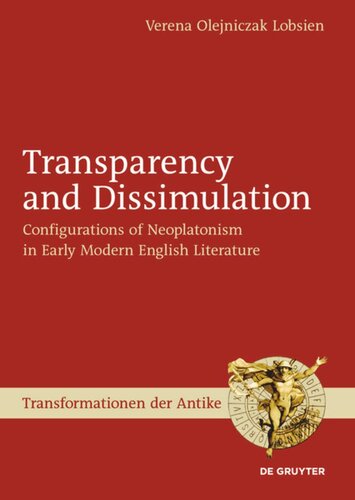

Most ebook files are in PDF format, so you can easily read them using various software such as Foxit Reader or directly on the Google Chrome browser.
Some ebook files are released by publishers in other formats such as .awz, .mobi, .epub, .fb2, etc. You may need to install specific software to read these formats on mobile/PC, such as Calibre.
Please read the tutorial at this link: https://ebookbell.com/faq
We offer FREE conversion to the popular formats you request; however, this may take some time. Therefore, right after payment, please email us, and we will try to provide the service as quickly as possible.
For some exceptional file formats or broken links (if any), please refrain from opening any disputes. Instead, email us first, and we will try to assist within a maximum of 6 hours.
EbookBell Team

5.0
80 reviewsTransparency and Dissimulation analyses the configurations of ancient neoplatonism in early modern English texts. In looking closely at poems and prose writings by authors as diverse as Thomas Wyatt, Philip Sidney, Edmund Spenser, John Donne, Edward Herbert, Andrew Marvell, Thomas Traherne, Thomas Browne and, last not least, Aphra Behn, this study attempts to map the outlines of a neoplatonic aesthetics in literary practice as well as to chart its transformative potential in the shifting contexts of cultural turbulency and denominational conflict in 16th- and 17th-century England. As part of a “new”, contextually aware, aesthetics, it seeks to determine some of the functions neoplatonic structures – such as forms of recursivity or certain modes of apophatic speech – are capable of fulfilling in combination and interaction with other, heterogeneous or even ideologically incompatible elements. What emerges is a surprisingly versatile poetics of excess and enigma, with strong Plotinian and Erigenist accents. This appears to need the traditional ingredients of petrarchism or courtliness only as material for the formation of new and dynamic wholes, revealing its radical metaphysical potential above all in the way it helps to resist the easy answers – in religion, science, or the fashions of libertine love.